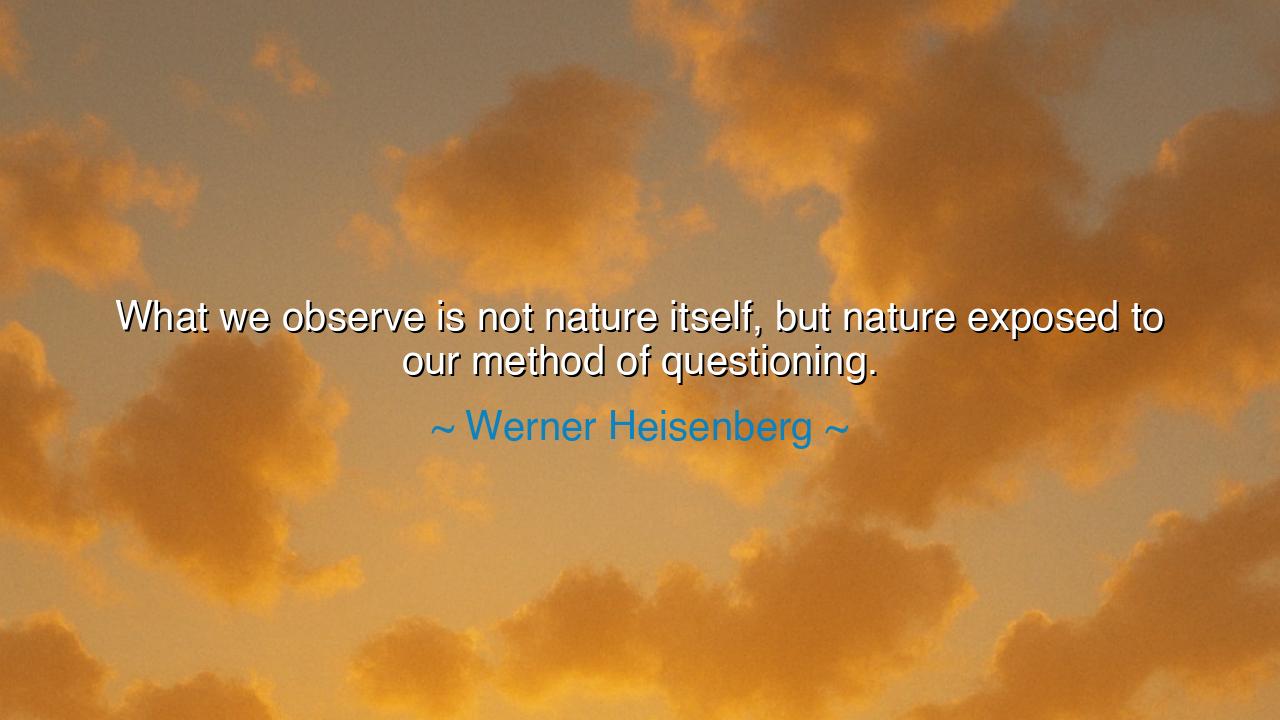
What we observe is not nature itself, but nature exposed to our






Hear the profound words of Werner Heisenberg, father of quantum uncertainty, who declared: “What we observe is not nature itself, but nature exposed to our method of questioning.” This is no light remark, but the revelation of a truth that shakes the foundations of how humanity understands the world. For Heisenberg, who gazed into the smallest particles of existence, knew that we do not see reality as it truly is, but only as it reveals itself through the tools, the thoughts, and the questions we bring. The world is not a silent stone; it is a mirror, reflecting back to us according to the light we shine upon it.
The ancients, too, knew this mystery, though they spoke in different tongues. Plato told of the cave, where men saw only shadows cast upon a wall, mistaking them for reality. Their observations were not of the true forms, but of what their limited sight allowed. So too, Heisenberg reminds us that even our science, powerful and noble, is still bound by the manner of its questioning. To look upon nature is not to behold it fully, but to behold what it permits us to see through the windows we open.
Consider the discovery of the electron. Before the advent of quantum physics, men thought of particles as tiny stones, solid and precise. But when the physicists began their questioning—when they measured, probed, and tested—the electron answered in riddles. Sometimes it behaved like a particle, sometimes like a wave, and never both at once when observed. The reality was not in the electron itself alone, but in the strange marriage between nature and the questions of man. Thus, Heisenberg saw clearly: our observation does not reveal nature in purity, but nature clothed in the garments of our inquiry.
History shows the same in other realms. When Columbus set sail, he questioned the world with ships and courage. The Earth responded not as an infinite void, but as a globe rich with lands unknown to Europe. Yet what he observed was shaped by the lens of conquest and empire, not by the fullness of truth. The peoples he met, the lands he claimed—these were observed through the method of his questioning, and so they were interpreted as possessions. Reality was broader, richer, deeper—but he saw it only through the net he cast.
The meaning of Heisenberg’s words is both humbling and empowering. They remind us that man is not a passive observer of a finished world; he is a participant, a questioner, a seeker. The answers he receives depend on the questions he dares to ask. Thus, nature is not a book read plainly, but a mystery that unveils itself differently to each approach. To the poet it speaks in beauty, to the philosopher in truth, to the scientist in mathematics, to the farmer in harvest. Each sees not the whole, but the reflection shaped by his method.
The lesson is clear: we must cultivate humility in our knowledge. No man, no science, no philosophy holds the entirety of truth, for all are limited by the way they question. To believe otherwise is arrogance; to recognize it is wisdom. Yet this truth also emboldens us: if we ask deeper questions, broader questions, more noble questions, then nature will unveil itself in ways yet unseen. The horizon of knowledge is not closed, but ever-expanding for those who know how to seek.
What, then, are the practical actions? First, examine the questions you bring to life. Are they narrow, selfish, and shallow? Then your answers will be so. Ask instead with wonder, with reverence, with courage, and the world will yield treasures. Learn not only through books, but through dialogue, through reflection, through different perspectives, for each method of questioning reveals a new face of reality. And above all, walk humbly: know that what you see is but a veil, and beyond every veil lies a greater mystery.
Thus Heisenberg’s words resound like an oracle: “What we observe is not nature itself, but nature exposed to our method of questioning.” Remember this, O seeker of wisdom, and let it shape your journey. For the world is not finished, and truth is not exhausted. Reality awaits those who dare to ask, and in each question lies the seed of revelation. Ask nobly, and the universe will answer in kind.






AAdministratorAdministrator
Welcome, honored guests. Please leave a comment, we will respond soon